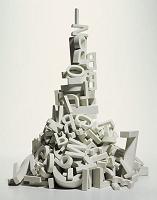| Pages in topic: [1 2] > | the notes at the end of books ?? Thread poster: vanilla_sky
|
|---|
Dear Colleagues,
Now, I'm working on a book whose notes are all indicating references the author used in his chapters. For example, they are all names of books , articles, and numbers of magazine issues, and page numbers. Now, I need to know whether their translation is a must or not . If they are to be translated, i think it would be a problem because they are all names of articles of famous magazines, which if translated, i believe they'd be vague and unfamiliar to the reader who ... See more Dear Colleagues,
Now, I'm working on a book whose notes are all indicating references the author used in his chapters. For example, they are all names of books , articles, and numbers of magazine issues, and page numbers. Now, I need to know whether their translation is a must or not . If they are to be translated, i think it would be a problem because they are all names of articles of famous magazines, which if translated, i believe they'd be vague and unfamiliar to the reader who may have access to such magazines and articles in their source language . so I think their translation would take the reader far away from what he already familiar with. Another thing is whether they are left untranslated in their source language, which is something i'm not sure of its validity.
or should we translate the names of references at all ?
please provide me with your experience in such issue. I'd be very grateful.
Thanks a lot ▲ Collapse
| | | | Hipyan Nopri 
Indonesia
Local time: 13:14
Member (2005)
English to Indonesian
+ ...
| It depends on | Dec 13, 2006 |
your agreement with the client. Before translating, you should have discussed it. If I were you, I would tell the client that the references should be kept in source language.
Happy translating.
[Edited at 2006-12-13 07:57]
| | | | Cristina Popescu (X) 
Romania
Local time: 08:14
English to Romanian
+ ...
Hi!
From my experience, you don't translate the references at all, because, as you've said, they would become vague once translated, so I just leave them with their original name. However, if there's a book that has been translated into the target language, I just add a note stating the translated name, the publishing house and the name of the translator.
I hope this helps.
Cristina.
| | | | Tim Drayton 
Cyprus
Local time: 08:14
Turkish to English
+ ...
| Don't translate proper nouns. | Dec 13, 2006 |
I think the names of publications and titles of books should, as proper nouns, be left in the original, if necessary transliterated into the Roman script. I would return the work without translating the section you mention, but if it worries you send a note explaining why you have left it out and offering to work on it if required.
| | |
|
|
|
vanilla_sky
Local time: 08:14
English to Arabic
+ ...
TOPIC STARTER
many thanks Cristina
so I leave them untraslated in their source language of cource , and I don't "transliterate" any thing ? Is this what you mean ?
But what if all the notes of each chapter were all references to books, mags , and articles , you know. I have to make notes to the books anyway. So do I make notes of my own like defining certain places, figures, and phenomena related to the culture of the ... See more many thanks Cristina
so I leave them untraslated in their source language of cource , and I don't "transliterate" any thing ? Is this what you mean ?
But what if all the notes of each chapter were all references to books, mags , and articles , you know. I have to make notes to the books anyway. So do I make notes of my own like defining certain places, figures, and phenomena related to the culture of the source language and so on ? ▲ Collapse
| | | | vanilla_sky
Local time: 08:14
English to Arabic
+ ...
TOPIC STARTER
thanks to all of view. So i've decided not to translate them as all of you said , but do you mean to spare with this section by excluding it completely from the book, or to include it in the book but to leave it untranslated in its source language? and what if I want to add my own notes ?
but asking the publisher won't help becasue he doesn't have experience in this field , so i'm the one to decide
so please help me
| | | | | Leave them as they are | Dec 13, 2006 |
Hi, I always leave them as they are unless told otherwise. Firstly, many non-native speakers may know these publications by their original title and it can be confusing to see them translated. If you do translate them, you will also need to check whether there is an official translation for each publication.
Finally (it may not be the case with your document) but many bibliographies will contain publications written in four, five or more different languages. You can't really s... See more Hi, I always leave them as they are unless told otherwise. Firstly, many non-native speakers may know these publications by their original title and it can be confusing to see them translated. If you do translate them, you will also need to check whether there is an official translation for each publication.
Finally (it may not be the case with your document) but many bibliographies will contain publications written in four, five or more different languages. You can't really start picking and choosing which you want to translate, as it will then be unclear to the reader which titles are original.
In general I would expect the reader of the book to have the list of references translated if he needed this. I think this is the most common practice, in fact I have translated bibliographies alone without the text or even the title of the book. Believe me, it's a real slog and best avoided if at all possible! The only caveat I would state is always to check whether a translation is needed if the source text and target are written using a different character set. From my experience (Russian to English) this is the only time a reference list needs to be translated.
Hope this helps,
Lizzy ▲ Collapse
| | | | Heidi C 
Local time: 01:14
English to Spanish
+ ...
| End notes, footnotes and sources | Dec 13, 2006 |
What I have done when translating footnotes or bibliography is the following:
1. leave the name of the book, author, article, etc. in the original language. After all, the purpose of this section is that the author is quoting his/her sources, so the information must allow the reader to find the sources if he/she would want to...
2. parts of the bibliographical information that do not affect finding the source (name of country, and, number, etc.) should be translated. (... See more What I have done when translating footnotes or bibliography is the following:
1. leave the name of the book, author, article, etc. in the original language. After all, the purpose of this section is that the author is quoting his/her sources, so the information must allow the reader to find the sources if he/she would want to...
2. parts of the bibliographical information that do not affect finding the source (name of country, and, number, etc.) should be translated. (that is, the bibliography note would look just as if you were quoting a source in another language when writing in your language).
3. Any additional comments in the footnote should be translated.
this works fine translating between English and Spanish (my languages)
Example:
footnote:
21. Lo mismo en las ratas machos: véase Fischer, Alan E., 1964.
(sorry, no format, everything after the : goes in itallics. The first part is in Spanish. Book translated from German)
Bibliography:
Fischer, Alan E., Chemical stimulation of the brain, Scientific American, 1964, t. 22, núm, 3, pp. 60-68
(here, t is for Tomo in Spanish, núm is for number...)
Altmann, S. y J. Altmann, Baboon ecology,, Karger, Basilea, 1970.
(two authors, "y" is instead of "and", Basilea is in Spanish)
Dröscher, Vitus B., Der Klapperstock un seine Babys. Documental para la televisión, WWF, 1970a.
(here, the name of source is in German, information that it is a TV documentary is in Spanish).
Dröscher, Vitus B. Ein Krokodil zum Frühstück, Düsseldorf, 1980. (Un cocodrilo para desayunar, Ed. Planeta, Barcelona.)
(this book has a translation in Spanish)
Dröscher, Vitus B., Die freundliche Bestie, Oldenburgo, 1969.
(here, book is in German, printing place is in Spanish)
Now, I assume you have the additional problem of transliteration if your language pairs include Arabic... Perhaps I would recommend transliterating, following a standard practice...
I found the following in a book in English quoting sources in Arabic: (sorry if I don't find in my keyboard the correct transliteration marks for some letters... also, have no idea of what the text in Arabic says, so I hope I am not quoting something inappropriate. Just using it as an example from a book I found in English.)
Notes:
The above are taken from 'Ali al-Din ibn Husam al-Din al-Muttaqi, Kanz al-'Ummal, 8 parts (Hyderabad, 1312; 1894-1895) vol. 2, pp. 252-286.
(actually, this book only has notes, no bibliography section)
hope this helps...
you should check in different translated books to see how the notes and bibliography are treated.
good luck ▲ Collapse
| | |
|
|
|
Attila Piróth 
France
Local time: 07:14
Member
English to Hungarian
+ ...
| Are you sure it is a serious publisher? | Dec 13, 2006 |
vanilla_sky wrote:
but asking the publisher won't help becasue he doesn't have experience in this field , so i'm the one to decide
Is it the first book for the publisher (and for you)?
I would advise you to get a good reference on book publishing; The Chicago Manual of Style can be a good starting point.
Good luck
Attila
| | | | Cristina Popescu (X) 
Romania
Local time: 08:14
English to Romanian
+ ...
| Translator's notes | Dec 13, 2006 |
Vanilla, I can't say anything about transliteration since I don't have this problem with my pairs, but as far as translator's notes go, the standard practice (at least in Romania) is you just add a small abbreviation in brackets (at the end of the note) stating who the note belongs to. This should follow every note, stating whether it belongs to the author, the translator or even the editor. You should check the standards in your own target language, since these abbreviations are conventionally ... See more Vanilla, I can't say anything about transliteration since I don't have this problem with my pairs, but as far as translator's notes go, the standard practice (at least in Romania) is you just add a small abbreviation in brackets (at the end of the note) stating who the note belongs to. This should follow every note, stating whether it belongs to the author, the translator or even the editor. You should check the standards in your own target language, since these abbreviations are conventionally set. It should be something like "t.n." - for "translator's note". I hope you can find this.
It would be a good idea for you to talk to your publisher about this, despite the lack of experience. My main publisher provided me with a list of such standards and abbreviations before I even began work on the first book.
A nice night to everyone,
Cristina. ▲ Collapse
| | | | vanilla_sky
Local time: 08:14
English to Arabic
+ ...
TOPIC STARTER
Many Thanks all of you . you really helped me a lot . I appreciate it to all of you.
Actually, i'm translating from English into Arabic . so the character set is different . I believe now I should translate things like " volume" , page numbers, name of the country , etc and leave the name of the reference in its source .
thanks a lot and if someone has any other comment please go ahead.
a last favor . is there anyone who can provide me with a list standar... See more Many Thanks all of you . you really helped me a lot . I appreciate it to all of you.
Actually, i'm translating from English into Arabic . so the character set is different . I believe now I should translate things like " volume" , page numbers, name of the country , etc and leave the name of the reference in its source .
thanks a lot and if someone has any other comment please go ahead.
a last favor . is there anyone who can provide me with a list standards or abbreviations in arabic ? ▲ Collapse
| | | | Cristina Popescu (X) 
Romania
Local time: 08:14
English to Romanian
+ ...
vanilla_sky wrote:
a last favor . is there anyone who can provide me with a list standards or abbreviations in arabic ?
Check the websites of the main Egyptian publishing houses. Sometimes they make this kind of information available. If not, you might be able to find it in a manual of style or in a publishing manual (there are such books that deal particularly with publishing houses). It might also be a good idea to contact an experienced book translator from Egypt. I'm sure they can help.
Best of luck.
| | |
|
|
|
| Never translate them!! | Dec 19, 2006 |
I advise you to leave those references untranslated. Most of the books I read are translated ones, and many of them are published from the "The Thousand Books' series" . I always see that all the Egyptian translators leave those references untranslated. To assure myself, I've just checked some of the translated books published by the "General Egyptian Book Organization" الهيئة المصرية العامة للكتاب and found that they all leave the references without any change. The onl... See more I advise you to leave those references untranslated. Most of the books I read are translated ones, and many of them are published from the "The Thousand Books' series" . I always see that all the Egyptian translators leave those references untranslated. To assure myself, I've just checked some of the translated books published by the "General Egyptian Book Organization" الهيئة المصرية العامة للكتاب and found that they all leave the references without any change. The only thing they translate is the foot- and end notes that may explain something in the text other than the authors and dates of publication of certain portions or quotations of the text. The only reason why I don't advise you to translate such words as "volume", "page number" and "name of country" and let the rest untranslated is that I've NEVER seen any Arab or Egyptian translator do that. It would be quite strange and totally unfamiliar if you did so.
My two cents
Regards,
Mahmoud
[Edited at 2006-12-19 14:03] ▲ Collapse
| | | |
Also bear in mind that references are made to "refer" the reader to the source of information and make it easy for him to go to the original article or book, he has after all to insert the exact and correct spelling of the reference he's trying to reach either in the bibliographical searching tools in libraries or the internet, therefore, any transliteration would render the names of authors, publishing houses and book titles uncomprehensible and unreachable. Imagine someone trying to search for... See more Also bear in mind that references are made to "refer" the reader to the source of information and make it easy for him to go to the original article or book, he has after all to insert the exact and correct spelling of the reference he's trying to reach either in the bibliographical searching tools in libraries or the internet, therefore, any transliteration would render the names of authors, publishing houses and book titles uncomprehensible and unreachable. Imagine someone trying to search for an original book written by the famous آينشتاين, how could he reach it unless he knows the exact spelling of the word, which is "Einstein". If anothe one written by ماكس بلانك, how could the reader know that the word بلانك is written as "planck" not "plank" etc.
However, If, for some or other reason, you had to write the name of the book or the writer within the text of the book, you have to transliterate it- if it is a proper name- or translate it- if it is a book. ▲ Collapse
| | | | vanilla_sky
Local time: 08:14
English to Arabic
+ ...
TOPIC STARTER
Thank you so much Mahmoud. you really helped me. now i'll leave them untranslated , but still there is one thing I want to ask you about . If I want to insert notes of my own such as the definition of a place or institution which is not known to the Arabic reader and the author take it for granted because he knows his readership from native english are familiar with them, should I insert them with the original notes in one section and write between brackets ( the translator) in Arabic, or this w... See more Thank you so much Mahmoud. you really helped me. now i'll leave them untranslated , but still there is one thing I want to ask you about . If I want to insert notes of my own such as the definition of a place or institution which is not known to the Arabic reader and the author take it for granted because he knows his readership from native english are familiar with them, should I insert them with the original notes in one section and write between brackets ( the translator) in Arabic, or this would be non-academic ?
thanks Mohamed and i'll double the two cents for you . ▲ Collapse
| | | | | Pages in topic: [1 2] > | To report site rules violations or get help, contact a site moderator: You can also contact site staff by submitting a support request » the notes at the end of books ?? | CafeTran Espresso | You've never met a CAT tool this clever!
Translate faster & easier, using a sophisticated CAT tool built by a translator / developer.
Accept jobs from clients who use Trados, MemoQ, Wordfast & major CAT tools.
Download and start using CafeTran Espresso -- for free
Buy now! » |
| | Pastey | Your smart companion app
Pastey is an innovative desktop application that bridges the gap between human expertise and artificial intelligence. With intuitive keyboard shortcuts, Pastey transforms your source text into AI-powered draft translations.
Find out more » |
|
| | | | X Sign in to your ProZ.com account... | | | | | |










